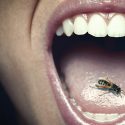You were so hungry that you barely chewed your meal. Now, a big chunk of food is stuck in your throat. If only there were someone around to help you. Your face is turning blue. Is this it? Is this how your life will end?
Choking occurs when a foreign object is lodged in the throat or windpipe, blocking the airflow. Adults usually choke on food, while children tend to choke on small objects, like pieces of toys.
And asphyxia happens when your body does not get enough oxygen to keep you from passing out. A person might not be able to speak and ask for help while choking, so look for signs like inability to talk, intense nose breathing, squeaky sounds, forceful coughing, and loss of consciousness. Also, look for skin, lips, and nails turning blue or dusky, or skin that is flushed and then turns pale.
But what if you’re the one who is choking and no one is there to help you? How much time would you have before dying? Should you drink water to push the food down? And how could a chair save your life?
Choking essentially cuts off oxygen to the brain, which is called cerebral hypoxia. Brain cells are sensitive to a lack of oxygen. Some brain cells start dying after less than 5 minutes without their oxygen supply. Irreversible brain death occurs in about 10 minutes.
In 2015, 5,051 people died from choking in the United States, according to an article posted on The National Safety Council. And 2,848 of them were older than 74. In the United States, the odds that you’ll die from choking on food is around 1 in 2,696. This is higher than the odds of dying from an accidental gun discharge or being a passenger on a plane. Choking while alone can be alarming, but if you remember these tips, you should be able to live.
Step 1. Don’t drink water
Do not try to force the food down your throat by drinking water. This can make the situation much worse and block your airway even more, making it impossible to dislodge the food.
Step 2. Eat slowly and Stay Sober
Prevent choking by taking small bites and chewing your food thoroughly. Don’t talk, and try not to laugh while you’re chewing. And be extra careful if you’re drinking alcohol. Having alcohol in your blood changes your perception of when you have chewed your food enough, so you tend to swallow sooner. In addition, the muscles in your throat aren’t as coordinated as when you are sober.
Step 3. Call for help
This may be against your instincts since you cannot breathe, but you need to call 911 immediately. You may not be able to vocalize what you are going through. But the operator can pick up cues when they hear you coughing and can dispatch first responders much quicker. Hopefully, the next steps will help you, and you can let them know that you’re OK.
But if you pass out, at least help will be on the way. In 2016, actress Ellen Barkin was having lunch, and she began to panic after food became stuck in her windpipe. She passed out, and was quickly taken to the hospital, where doctors performed tests and discharged her that night.
Step 4. Cough hard
If you can cough, make a sound, laugh, or cry, that is good news. It means that your airway is not completely blocked. So try to cough as forcefully as possible until the object blocking your windpipe is forced out.
Step 5. Use the Heimlich Maneuver
You will not be able to deliver back blows to yourself effectively. But you can perform abdominal thrusts to dislodge the item. Place a fist slightly above your navel, then place your other hand on top of the fist. Push inwards and upwards, as hard as you can, in a quick motion. This pressure on the diaphragm compresses the lungs and forces the remaining air to push up through the trachea, hopefully dislodging the food. You can also use a countertop or the back of a chair to press your stomach.
Step 6. Assess the damage
Those hard thrusts can hurt your abdomen and organs. If you had to push hard many times, you could be facing a ruptured spleen or other issues. Also, there’s a chance some of the food could have gone into your lungs, which might cause inflammation, infection, or collapse them. If you feel pain in your stomach or you still can’t breathe properly, go to a hospital immediately.
Never underestimate the importance of having a basic knowledge of first aid. Remembering these simple steps can mean the difference between life and death.
Sources
- “Choking: First Aid“. 2021. Mayo Clinic.
- “What Is Asphyxia?“. webmd.com.
- “Cerebral Hypoxia: Medlineplus Medical Encyclopedia”. medlineplus.gov.
- “5 Myths And Truths About Choking“. Melanie Potock MA. 2016. Leader Live.
- “How To Stop Choking When You’Re All Alone “. Elizabeth, Millar. 2017. Men’s Health.
- “Bacchus Maneuver | Office Of Alcohol Policy And Education”. 2021. alcohol.stanford.edu.
- “Facts About Alcohol Overdose For Students”. 2021. collegedrinkingprevention.gov.




























[…] someone is choking? By – NHS.uk How to stop a child from choking By – NHS.uk How to Survive Choking When Alone By – whatifshow.com Choking and the Heimlich Maneuver By – […]